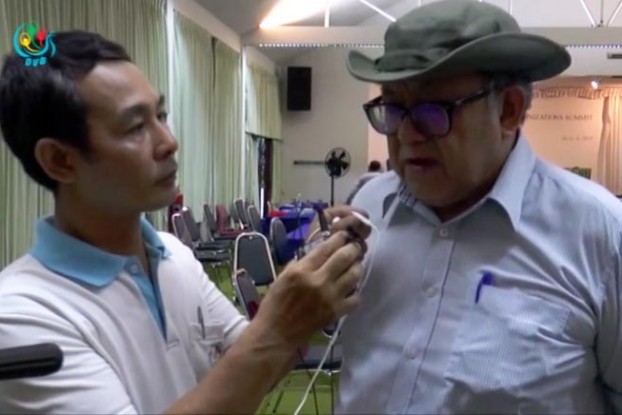Following three days of talks in Chiang Mai among the ethnic leaders known as the Senior Delegation, five members were chosen to represent the various ethnic voices at a summit with the president and his team in the near future. The five ethnic representatives are expected to accompany three members of the Senior Delegation to the Burmese capital for what could be pivotal talks.
DVB spoke to Col. Hkun Okker, chairman of the Pa-O National Liberation Organisation and a senior statesman among the ethnic coalition, about the potential for a ceasefire agreement and the next steps forward in this long and complex peace process.
Q: Who is included in the five-person delegation appointed to go to Naypyidaw to meet with President Thein Sein and Commander-in-Chief Snr-Gen Min Aung Hlaing?
A: We have appointed representatives of the ‘Big 5’: the KIO [Kachin Independence Organisation]; KNU [Karen National Union]; KNPP [Karenni National Progressive Party]; SSPP [Shan State Progressive Pasty, political wing of the Shan State Army- North]; and NMSP [New Mon State Party].
Their leaders are experienced, wise and rational. They were nominated to meet government leaders in Naypyidaw to discuss the country’s future in the interest of all ethnic populations; and to finalise the NCA [Nationwide Ceasefire Agreement] and take the next steps forward. We believe that the upcoming meeting will build mutual trust and respect, and result in a recognition between both sides’ delegates that will allow the NCA to move ahead in a smoother fashion.
Q: What is the common opinion regarding the groups [MNDAA, TNLA, etc.] that have been left out of the NCA deal?
A: It wasn’t us, the ethnic coalition, who omitted those groups; that was the government’s decision. The government has its own reasons and explanations for leaving them out. It is hard for us to pressure them to include these armed groups without losing face. Nonetheless, our leaders see it as their responsibility to negotiate with the government to have these groups included in the ceasefire. We want to see everyone included.
In order for successful negotiations to move forward, the government must show some understanding of the setbacks faced by their counterparts. If the government still cannot accept those groups, then we must all work together to find a solution where no one loses.
Q: It seems that – of the six armed groups excluded – the government is particularly bitter about the Kokang army [MNDAA]. What role can any of these six groups play in creating political framework and participating in the political dialogue?
A: We believe that each ethnic nationality should be represented. This is important for them and they cannot afford to miss this opportunity. We have concluded that all-inclusiveness is even more important during the phase of political dialogue, and we should strive to ensure that those groups are represented one way or another.
Q: We understand that at your Senior Delegation meeting today, you also brainstormed some policies on DDR [demobilise, disarm, reintegration] and SSR [security sector reform]. What was the outcome?
A: We will deal with the SSR and DDR procedures as provided for in the NCA, which specifies that they must be included on the agenda within the rounds of political dialogue that follow the signing of the [ceasefire] agreement. However, there is no proviso that these procedures are to be implemented straight away, only that they will be based on the outcome of the final Union Peace Conference [the final stage of the peace process].
So we have no plan to implement SSR and DDR procedures in three to five years’ time while we engage in the political dialogue. In the meantime, we are to live peacefully in our own territory with our arms. As we only agreed to the NCA, procedures suggested differently from the agreement are not relevant to us.
Q: When does the delegation plan to travel to Naypyidaw?
A: The government suggested we should be in Naypyidaw on 28 August at the latest, but our leaders think the summit will only be possible in September, so there has been no agreement on a date yet. Some of the government representatives have overseas trips planned for the beginning of September, and they have a tight schedule. We must still negotiate a date.
Q: Does the senior delegation plan to meet again for talks in Chiang Mai after this meeting? Or do you think the NCA can be signed in Naypyidaw at this upcoming visit?
[related]
A: Our ‘Big 5’ delegation is heading to Naypyidaw to finish the job the Senior Delegation couldn’t. They will be looking to finalise the NCA, but in order to sign it, that will require unity between all the groups involved. Ultimately, we must sign altogether even if we have to make individual decisions before committing to it.
Therefore the upcoming trip to Naypyidaw is not to sign an NCA, but to finalise a deal.
Q: Anything you would like to add?
A: The leaders of the five major ethnic groups are heading to Naypyidaw hoping to rebuild the union – for the love of the union. We will find a way to co-exist because we do not wish to see the union break apart.



